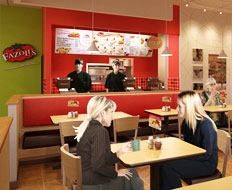With at least two mid-size restaurant chains planning to expand through highway travel centers in the coming year, other quick serves looking to grow may want to hit the open road.
Both Huddle House and Fazoli’s, which, respectively, have 430 locations and 230 locations nationwide, are in the process of opening new stores at roadside travel centers, according to the companies.
Huddle House is a diner concept based in Decatur, Georgia, and is planning to add six truck-stop locations to the 25 it already has through an agreement with travel-center operator Pilot Flying J.
“We have a renewed focus on travel centers,” says Mark Whittle, Huddle House’s Chief Development Officer. “Truckers are a great fit demographically. Some of these gentleman can put away a lot of food.”
To accommodate the large appetite of an average trucker, Whittle says, Huddle House offers a supplemental menu at its truck stop locations with heartier portions called the “Big Rig.”
Truckers “want food fast, but they don’t want fast food,” Whittle says, so Huddle House, a full-service concept, puts a strong emphasis on speed of service at its truck stop locations. The goal, Whittle says, is to get truckers back on the road in less than 28 minutes.
At travel plazas geared toward car traffic, quick-service restaurants are a good fit for customers who are looking to get back on the road as fast as possible, says Bill Casey, vice president of restaurant development at HMSHost, a food, beverage, and retail services provider at travel plazas across the country.
“Restaurants in travel plazas serve customers who are going from point A to point B—they’re usually on their way to vacation or a business meeting,” Casey wrote in an email to QSR. “So, more than likely, they are in a hurry and want to stop quickly and get a good bite to eat as well as a good cup of coffee.”
While speed of service is a common challenge in the quick-service sector, there are other factors that are unique to travel centers, including an unexpected rush from a tour bus, says Carl Howard, CEO of Fazoli’s, a fast-casual Italian concept based in Lexington, Kentucky.
“One thing we think will be different is that we will see a steady stream of business all day long, instead of just a heavy hit at lunch and a heavy hit at dinner,” Howard says.
Despite citing other potential challenges (including smaller seating areas and faster turnover), Howard says the pros of the travel-center strategy outweigh the cons and that Fazoli’s is planning to open as many as 10 travel-center locations in 2012. The stores will account for about 50 percent of Fazoli’s system expansion next year, Howard says.
One of the major benefits of opening locations along the nation’s highways, Howard says, is brand exposure.
“It’s an opportunity for us to get in with operating brands that have attractive real estate that typically would be hard for us to stumble onto,” he says.
Dennis Lombardi, executive vice president at food-service strategies firm WD Partners, agrees.
“Those kinds of locations … are a little more taxing, because their hours of operations tend to be longer, but they provide very good visibility, very good brand exposure, and typically pretty high volumes,” Lombardi says.
Another challenge that is specific to travel-center restaurants, says Lombardi, is that they tend to have smaller kitchens. But “if you can break through the logistics,” he says, the advantages of brand exposure and high traffic make the locations worthwhile.
In the last several years, travel centers have gone through a significant evolution when it comes to foodservice. Whereas their operators used to offer mainly proprietary food options, they have since partnered with local, regional, and national restaurant brands. Today, many travel centers resemble a food court at a commercial mall, with a mix of full-service and quick-service options, a name-brand café, and retail stores.
HMS Host, one of the biggest travel-plaza operators, works with several restaurant-industry brands, including California Pizza Kitchen, Popeye’s, Burger King, and Starbucks. The key to success, Casey says, “is in having great food that appeals to a variety of travelers, which can also be prepared fresh and quickly in a high-traffic setting.”
Howard, the CEO of Fazoli’s, says travel centers are a particularly good fit for a regional brand because “all of the majors are typically saturated in these markets.”
“It is really a perfect storm for us, and I think it can be a way for us to rapidly grow the brand,” he says.




